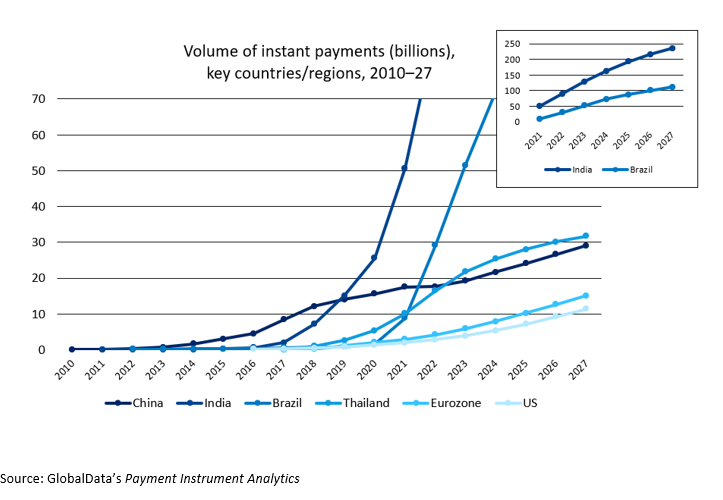The European Council reached an agreement earlier this month with the European Parliament on the instant payments legislation first proposed last October as part of the bloc’s policy of fostering the development of competitive pan-European market-based payment solutions. The move comes amid the European region scoring at the bottom of the list for instant payments usage globally, with almost a quarter of consumers in Europe having never heard of the service before, according to GlobalData’s 2023 Financial Services Consumer Survey.
Striving to remain a powerful region, it is important for the EU to stay on track with the pursuit of sovereign national payment systems observed globally, given the strategic importance of the digital payments industry for economic development. The European Commission reported that almost €200bn ($218.5bn) are locked in a payment float on any given day that can be freed up with instantaneous settlements and reinjected into the economy faster.
New rules proposed to take effect in Q4 2024
Expected to be in effect from Q4 2024, the new rule will require all payment service providers (such as banks) to facilitate all transfers across the Eurozone within 10 seconds, 24/7 365.
The legislation also sets out that a real-time payment (RTP) cannot cost the end user more than a standard credit transfer, meaning that cost concern is the biggest challenge for implementation. The current operating model is designed to provide payment processing at the lowest possible operational cost, leaving a margin revenue stream after each transaction. The new requirements necessitate a reform of the underlying technology currently in use, and while big banks have been pouring money into tech hiring and infrastructures, smaller businesses may struggle to find cost-effective solutions to meet compliance standards
To level the playing field, the Parliament negotiating team secured that under certain conditions, fintech companies will be granted direct access to the European Central Bank’s payment infrastructure. Once in function, the Commission plans to expand the instant payments initiative to all nations of the European Economic Area, revolutionising cross-border payments on the continent.
GlobalData Payment Instrument Analytics
GlobalData’s Payment Instrument Analytics reveals that India is leading by far on RTP volume globally, reaching almost 90 billion transactions in 2022. It overtook China in 2019, which was an inflection point for the Eurozone as well as it reached 1 billion RTPs that year, overtaking the US for the first time. Brazil more than tripled its instant payments volume last year to nearly 30 billion, while Thailand is expected to overtake China this year. These four emerging economies alone account for approximately 80% of RTPs globally, as the highly popular mobile wallets in these regions are built directly on instant payment infrastructure.

Despite lagging behind developing nations, GlobalData’s Payment Instrument Analytics forecasts the Eurozone to triple RTP volume by 2027, amid somewhat slowing growth elsewhere. As the regionalisation trend prevails, facilitating affordable and seamless RTPs across such highly interconnected and interdependent nations is among the EU’s strategic efforts to remain competitive on a global scale. The European Payments Initiative is also set to develop a pan-European digital wallet called ‘Wero’, mirroring some of the successful Asian models.
Blandina Hanna Szalay is an analyst in banking & payments, GlobalData








